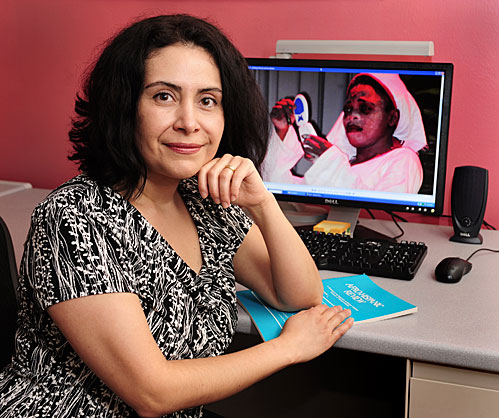April 22, 2010

Elisa Rizo is one of the first researchers to study the theatrical literature of Equatorial Guinea. In a March trip to the country, she attended three live performances. Photo by Bob Elbert.
Beyond borders
by Laura Engelson, LAS Communications
Elisa Rizo doesn't limit herself to any geographic boundaries. The assistant professor of world languages and cultures studies situations in which cultures and identities overlap, often transcending established borders and creating new cultural spaces.
One of those little known spaces is the literature of Equatorial Guinea, the only Spanish-speaking nation in sub-Saharan Africa. A very small country surrounded by French-speaking nations, its Hispanic identity has grown in relative isolation from the rest of the Hispanic world, Rizo said.
Equatorial Guinea gained its independence from Spain in 1968, and its national literature still is developing. Despite the fact that there is little government support for literary pursuits and virtually no libraries open to the public, Rizo said Equatorial Guinea is developing a vibrant literary culture.
"It's important to look at local, specific cases. Sometimes the bigger picture can be seen in the smaller details."
-- Elisa Rizo
Literature as drama
One of the most accessible forms of this expanding literary culture is theater, a focal point of Rizo's research.
"Theater is an accessible venue in Equatorial Guinea for sharing ideas and dialoguing," Rizo said.
She has studied videos and scripts from Equatorial Guinean dramas, which are developed with few resources besides the local writers' and theater companies' creativity.
The theatrical literature in Equatorial Guinea is not well known around the world except by a handful of specialists, Rizo said. She is one of the first to fully engage in research of Equatorial Guinean theater.
Rizo traveled to Equatorial Guinea last month, in part to attend three live drama performances by the Bocamandja theater company.
"It was important to see the reaction of the audience and how the live performance opens the doors for other possible meanings of the dramas in print," she said.
The performances focused on a range of issues -- such as equality, women's rights, corruption and the future of the country -- geared to instill civic participation, Rizo said. She observes the ways in which writers describe their local experiences, and how those experiences reflect global issues.
Black Seminole research
Rizo's research involves another little-known edge of the world: the diaspora of Black Seminoles into Mexico. Black Seminoles, as they became known, are descendents of African-American slaves in the Gullah region of South Carolina and Georgia who escaped slavery in the late 1600s and formed an alliance with the Seminole Indians in the Florida wilderness.
Rizo studies the transformation of their cultural identity and their connections with their "base" culture: the Gullah Geechee Nation, which extends from Jacksonville, N.C., to Jacksonville, Fla.
The Black Seminoles eventually split and some migrated to the U.S./Mexico border. Rizo studies how this group of dispersed people is represented in Mexican literature and media versus how they represent themselves in literature or at cultural events and celebrations.
Rizo has traveled to the U.S./Mexico border with Queen Quet, the chieftess of the Gullah Geechee Nation, and has met with the chief of the Black Seminoles. On these visits, she learned about how they track their own history.
"In my research, I highlight the way in which Black Seminoles and the Gullah-Geechee present their oral tradition," she said.
Back in class
Rizo's students also are learning about the literatures and cultures of Equatorial Guinea and the Black Seminoles, especially when she teaches a seminar on Afro-Hispanic civilization.
In her Latin America Today class, she delves into contemporary popular culture, film and art that responds to political movements, free trade agreements and social justice issues.
Another class she enjoys teaching is Spanish for the Professions, in which students learn about professional practices in the fields of business, engineering and agriculture within the Hispanic world. Students also are encouraged to analyze the potential social impacts that professional decisions may have.
Through these classes, Rizo hopes her students will understand that cultures are dynamic and flexible.
"It's important to look at local, specific cases," she said. "Sometimes the bigger picture can be seen in the smaller details."